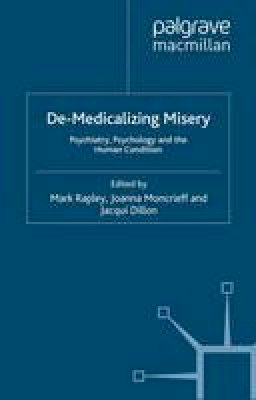
Stock image for illustration purposes only - book cover, edition or condition may vary.
De-Medicalizing Misery: Psychiatry, Psychology and the Human Condition
Joanna Moncrieff
FREE Delivery in Ireland
Description for De-Medicalizing Misery: Psychiatry, Psychology and the Human Condition
Paperback. Psychiatry and psychology have constructed a mental health system that does no justice to the problems it claims to understand and creates multiple problems for its users. Yet the myth of biologically-based mental illness defines our present. The book rethinks madness and distress reclaiming them as human, not medical, experiences. Editor(s): Rapley, Mark; Moncrieff, Joanna; Dillon, Jacqui. Num Pages: 320 pages, 1 figures. BIC Classification: JKSM; JMP; MMH. Category: (P) Professional & Vocational. Dimension: 141 x 217 x 19. Weight in Grams: 414.
Psychiatry and psychology have constructed a mental health system that does no justice to the problems it claims to understand and creates multiple problems for its users. Yet the myth of biologically-based mental illness defines our present. The book rethinks madness and distress reclaiming them as human, not medical, experiences.
Product Details
Publisher
Palgrave Macmillan
Place of Publication
Basingstoke, United Kingdom
Shipping Time
Usually ships in 15 to 20 working days
About Joanna Moncrieff
JAMES BOURNE Clinical psychologist and is currently working London, UK MARY BOYLE Professor Emerita of Clinical Psychology at the University of East London, UK PATRICK BRACKEN Consultant Psychiatrist and Clinical Director of Mental Health Services in West Cork, Ireland CARLTON COULTER Clinical Psychologist who lives and works in East London, UK RUDI DALLOS Professor ... Read moreof Clinical Psychology and Programme Director of the Doctor of Clinical Psychology Training Programme, College of St Mark and St John, Plymouth, UK DUNCAN DOUBLE Consultant Psychiatrist in Norfolk & Waveney Mental Health NHS Foundation Trust and Honorary Senior Lecturer at the University of East Anglia, UK SUMAN FERNANDO Former Consultant Psychiatrist in Enfield for over twenty years and then an Academic at the Tizard Centre, University of Kent at Canterbury, UK. He is involved in voluntary organisations serving black and minority ethnic (BME) communities in London and Sri Lanka DAVID J. HARPER Reader in Clinical Psychology at the University of East London, UK LUCY JOHNSTONE Clinical Psychologist and Counselling Psychologist, and formerly Programme Director of the Bristol Clinical Psychology Doctorate, UK IRVING KIRSCH Professor of Psychology at the University of Hull, UK CRAIG NEWNES Former Director of Psychological Therapies and a past-Chair of the BPS Psychotherapy Section, and Former Head of Clinical Psychology Services in Nottingham and Special Professor of Clinical Psychology at Nottingham University, UK NIMISHA PATEL Reader in Clinical Psychology on the Doctoral Degree Programme in Clinical Psychology, University of East London, UK, and Lead Consultant Clinical Psychologist and Head of Audit, Evaluation and Research at the Medical Foundation for the Care of Victims of Torture DAVID SMAIL Former Head of Clinical Psychology Services in Nottingham and Special Professor of Clinical Psychology at Nottingham University, UK EWEN SPEED Lecturer in Medical Sociology in the Department of Health and Human Sciences at the University of Essex, UK PHILIP THOMAS Writer and Honorary Visiting Professor in the Department of Social Sciences and Humanities in the University of Bradford, UK SAMI TIMIMI Consultant Child and Adolescent Psychiatrist in the National Health Service, UK and Visiting Professor of Child and Adolescent Psychiatry at the University of Lincoln, UK ARLENE VETERE Professor of Clinical Psychology at Surrey University, UK, and a UKCP registered Systemic Psychotherapist Show Less
Reviews for De-Medicalizing Misery: Psychiatry, Psychology and the Human Condition
'Despite longstanding awareness of the limitations of the medical model when applied to difficulties of human behavior and adjustment, the fields of psychiatry and psychology continue to accede to the pressures of medicine and the drug industry in their conceptualization of these human realities. Ironically, however, this medical model, eager as it is to fit so much of people's experience ... Read moreinto diagnostic categories, is a social construction. This book represents a significant effort to de-mystify, de-medicalize, and reclaim important aspects of the human condition.' -Kenneth D. Keith, Professor, Department of Psychological Sciences, University of San Diego, USA 'De-Medicalizing Misery has assembled an impressive cast of leading mental health experts. Together they challenge the simplistic and pessimistic biological model of human distress that has, with eager support from the pharmaceutical industry, dominated the mental health field for far too long. This evidence-based, humane and optimistic book not only explains where biological psychiatry went wrong, it spells out the alternatives.' - John Read, University of Auckland, New Zealand and Editor of 'Models of Madness' 'The psychiatrist or psychologist is expected to do something for every patient sitting in front of him or her, but how robust is the intellectual basis of psychiatric science when psychiatric 'diseases' are merely symptom clusters - clustered by us, not by nature? We are in indeed in the age of the medicalization of everyday life, when Lord Layard, economist and architect of the IAPT programme, can write in the BMJ that 'mental illness' has taken over from unemployment as our greatest social problem. But what is the test of 'mental illness'? In DeMedicalizing Misery the authors examine some of the domains lamentably absent from orthodox psychiatry and psychology training programmes, with their medical model focus, and in so doing raise the IQ of the whole debate. And not just for clinicians.' - Dr Derek Summerfield, Consultant Psychiatrist & Senior Lecturer, Institute of Psychiatry, King's College, London, UK. '...this is a great book and should be on the shelf of AMHPs (Approved Mental Health Practitioners), practitioners, academics, people with their doubts about the psyprofessions, those too sure of psy-professions, and perhaps essential reading for people who have survived services, have felt their misery with little relief and have wondered what it is about themselves that remains untreatable.' - British Journal of Social Work 'This book could not be more relevant than now...' - The Psychologist Show Less

